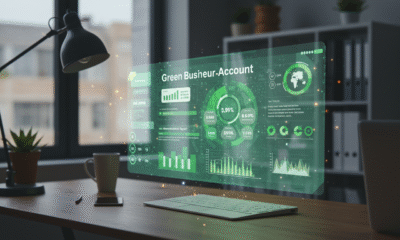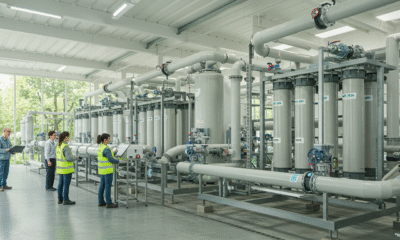

Energy
Is Your Company’s Technology Energy-Efficient and Secure?
Sustainability and green initiatives have grown in importance for businesses in recent years. Although firms are implementing many eco-friendly activities and policies, there is increasing pressure to take positive steps when it comes to technology and IT equipment.
Sustainability reports are considered the norm in many companies. With new patterns of remote or hybrid working, green companies, however, strive to do more by sourcing eco-friendly products, identifying energy-efficient equipment (and processes), and investing in renewable energy. However, one significant area where organizations can make a difference is their online security.
As companies expand and become more collaborative and connected through technology, their critical systems must stay secure. However, can this strategy truly be considered energy-efficient?
Quantifying How Much Energy Technology Drains
Energy consumption by IT equipment, computers, servers and thousands of other IoT (Internet of Things) devices is notoriously lacking in measurable data. A whitepaper conducted by The Shift Project summarized that in the global effort to end dependence on fossil fuels, digital technologies are essential. But the energy impact of this growing use could cause a ‘net increase’ in sectors’ carbon footprint.
It’s almost impossible to estimate every single device’s usage as it pertains to a company’s own energy-preservation efforts. Even more challenging is the challenge to estimate the electricity consumed in securing devices, networks and systems. In addition, you will also need to calculate the energy costs in protecting a business’ IT equipment from cyber-attacks.
Tech experts will usually be the first to highlight how energy-efficient modern digital devices and systems are within a company. Meanwhile, there is a counterargument that argues that the IT industry’s share of energy use is steep, producing total emission levels similar to that of global transport.
Despite the evidence that IT and cybersecurity cannot be considered 100% green and renewable, it’s only fair to applaud the industry’s efforts at finding renewable sources to use. Furthermore, it cannot be denied that modern digital technology can optimize how more energy-intensive activities can be conducted.
Safeguarding a Company’s Essential Cybersecurity
It’s easy to overlook the amount of energy used when using essential devices, appliances and systems every day, whether for work, school or personal enjoyment.
All of these everyday devices emit energy, whether mobile phones, computers, boilers, washing machines, lights or heating systems, and the reality is, all of these devices are necessary. The adequate and appropriate protection of these devices is also crucial and fundamental for their successful operation and synchronicity.
The risk of cyber threats has only grown in scale and severity over the years. Cyberthreats range from financial crime, ransomware, DDoS (distributed denial of service) and malware to hacking secure networks and systems to gain access to sensitive information.
The threat landscape remains volatile for companies across all industries, and, ironically, the energy industry is particularly susceptible. Cybercriminals may be financially, economically or politically motivated, with attacks severely disrupting activities. Not just daily activities and operations, but long-term strategic ones too.
Mark Nicholls, Chief Research Officer of cybersecurity firm Redscan, reported results from a survey showing CFOs showing ‘overconfidence’ around cyber risks.
“Our new CFO cybersecurity survey, which surveyed 180 CFOs, CEOs and other financial executives worldwide, has highlighted the fact that Chief Financial Officers are very confident in their companies’ abilities to ward off cyber security incidents, despite being under informed on the cyber risk their businesses face.
Almost 87% of the surveyed executives expressed this confidence, yet 61% of them had suffered at least three significant cyber incidents in the previous 18 months.”
- Mark Nicholls, CRO, Redscan
Companies that are taking steps to improve global energy efficiency might be severely stunted if they do not implement proper security controls to protect networks and infrastructure.
Simply ignoring cybersecurity is not an option, so what can businesses do to make sure this requirement is addressed in a way that doesn’t prohibit their energy preservation?
Enhancing Energy Efficiency Through Tech
Investing in environmentally friendly technology is one of the most effective ways that a business can save more energy. This can range from small changes such as LED lighting, green switches and smart heating controls to large-scale systems like wind turbines, solar panels, geothermal heating or even water conservation plans.
Establishing widespread use of energy-efficient technologies requires companies to be mindful of future cyber needs. Building owners will likely need to upgrade IT infrastructure to accommodate modern safeguarding, so they must be supported to ensure all changes are handled with excellent care and consideration for preserving energy.
Interestingly, the Internet of Things Cybersecurity Act (2020) required the National Institute of Standards and Technology (NIST) to develop clear guidelines for managed IoT devices. As an outline, it requires steps that new devices be tagged with unique identifiers and automatically patched with updates when prompted. This maximizes efficiency and safety while not requiring additional energy to implement.
The future looks promising for technological innovation, but that doesn’t change the fact that energy requirements are also likely to grow to accommodate this shift. Companies, energy providers and security experts must work in close collaboration to protect our future.


 Environment12 months ago
Environment12 months agoAre Polymer Banknotes: an Eco-Friendly Trend or a Groundswell?

 Features11 months ago
Features11 months agoEco-Friendly Cryptocurrencies: Sustainable Investment Choices

 Features12 months ago
Features12 months agoEco-Friendly Crypto Traders Must Find the Right Exchange

 Energy11 months ago
Energy11 months agoThe Growing Role of Solar Panels in Ireland’s Energy Future




























